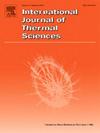Study on the novel flat heat pipe-based battery thermal management system for cylindrical Li-ion batteries
IF 4.9
2区 工程技术
Q1 ENGINEERING, MECHANICAL
International Journal of Thermal Sciences
Pub Date : 2025-05-26
DOI:10.1016/j.ijthermalsci.2025.109997
引用次数: 0
Abstract
The battery thermal management system (BTMS) is essential for ensuring the safety and reliability of power systems. The rapid advancement of transportation electrification and urban air mobility (UAM) has introduced high discharge rates and fast-charging scenarios, presenting significant challenges to conventional BTMSs. In this study, a novel flat heat pipe-based BTMS (FHP-BTMS) was developed for 21,700 cylindrical lithium-ion batteries. A dynamic electro-thermal model was established using thermal network modeling (TNM) and was experimentally validated with an error of 4.69 %. The effects of various FHP design parameters on thermal performance were analyzed, followed by a sensitivity analysis. Optimal ranges for the relative contact area and the evaporation-to-condensation length ratio were identified. Subsequently, the thermal performance of the FHP-BTMS under different operating conditions was evaluated. Under 2C discharge, the FHP with air cooling maintained the battery temperature at 46.94 °C, reducing the temperature rise by 2.99 °C and improving temperature uniformity by 73.73 %, compared to direct air cooling with the same thermal management power consumption. Under vertical take-off and landing (VTOL) conditions for flying cars, the FHP with air cooling could extended the mission profile to a VTOL altitude of 500 m and a range of 80 km.
新型圆柱形锂离子电池平板热管热管理系统研究
电池热管理系统(BTMS)是保证电力系统安全可靠运行的关键。交通电气化和城市空中交通(UAM)的快速发展带来了高放电率和快速充电场景,给传统的btms带来了重大挑战。在这项研究中,开发了一种新型的基于扁平热管的BTMS (FHP-BTMS),用于21,700个圆柱形锂离子电池。利用热网络模型(TNM)建立了动态电-热模型,并进行了实验验证,误差为4.69%。分析了FHP各设计参数对热工性能的影响,并进行了灵敏度分析。确定了相对接触面积和蒸发-冷凝长度比的最佳范围。随后,对FHP-BTMS在不同工况下的热性能进行了评价。在2C放电条件下,与相同热管理功耗的直接空冷相比,采用空冷的FHP将电池温度维持在46.94℃,温升降低2.99℃,温度均匀性提高73.73%。在飞行汽车的垂直起降(VTOL)条件下,带有空气冷却的FHP可以将任务剖面扩展到500米的垂直起降高度和80公里的航程。
本文章由计算机程序翻译,如有差异,请以英文原文为准。
求助全文
约1分钟内获得全文
求助全文
来源期刊

International Journal of Thermal Sciences
工程技术-工程:机械
CiteScore
8.10
自引率
11.10%
发文量
531
审稿时长
55 days
期刊介绍:
The International Journal of Thermal Sciences is a journal devoted to the publication of fundamental studies on the physics of transfer processes in general, with an emphasis on thermal aspects and also applied research on various processes, energy systems and the environment. Articles are published in English and French, and are subject to peer review.
The fundamental subjects considered within the scope of the journal are:
* Heat and relevant mass transfer at all scales (nano, micro and macro) and in all types of material (heterogeneous, composites, biological,...) and fluid flow
* Forced, natural or mixed convection in reactive or non-reactive media
* Single or multi–phase fluid flow with or without phase change
* Near–and far–field radiative heat transfer
* Combined modes of heat transfer in complex systems (for example, plasmas, biological, geological,...)
* Multiscale modelling
The applied research topics include:
* Heat exchangers, heat pipes, cooling processes
* Transport phenomena taking place in industrial processes (chemical, food and agricultural, metallurgical, space and aeronautical, automobile industries)
* Nano–and micro–technology for energy, space, biosystems and devices
* Heat transport analysis in advanced systems
* Impact of energy–related processes on environment, and emerging energy systems
The study of thermophysical properties of materials and fluids, thermal measurement techniques, inverse methods, and the developments of experimental methods are within the scope of the International Journal of Thermal Sciences which also covers the modelling, and numerical methods applied to thermal transfer.
 求助内容:
求助内容: 应助结果提醒方式:
应助结果提醒方式:


